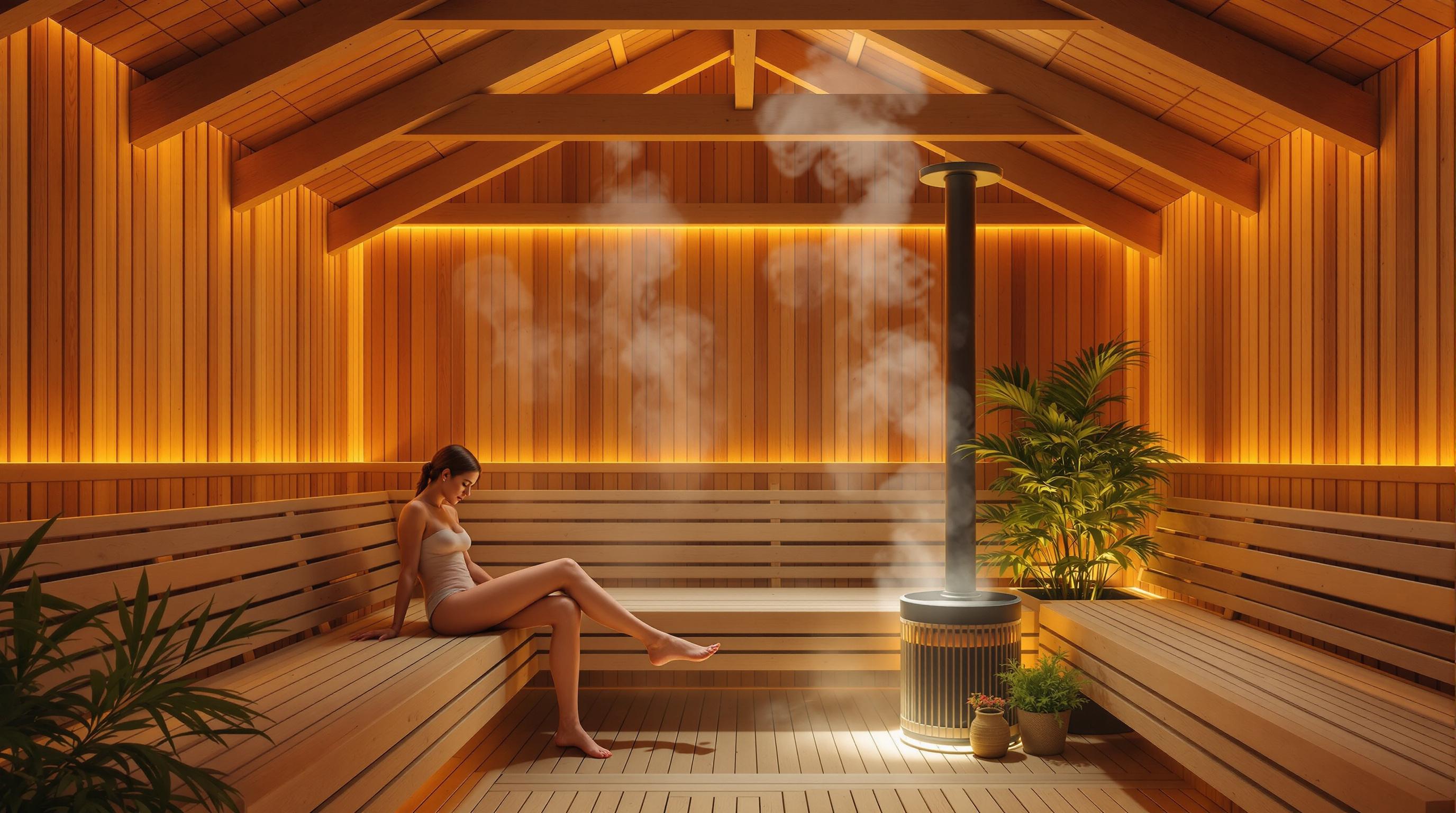Saunas can boost your immune system by increasing white blood cell activity, helping fight infections and improve overall health. Here's what you need to know:
- How It Works: Heat stress from saunas triggers immune responses, like activating heat shock proteins and increasing white blood cells (lymphocytes, neutrophils, basophils).
- Benefits: Regular sauna use can reduce colds and respiratory infections, especially with sessions 1-2 times per week.
- Athletes vs. Non-Athletes: Athletes often experience stronger immune boosts compared to non-athletes.
- Tips for Use: Aim for 15-20 minutes at 175-185°F, followed by a cool-down, and stay consistent for long-term benefits.
Saunas are a practical way to strengthen immunity, but more research is needed to explore their full impact.
Literature Review - Immune Benefits of Sauna
How Saunas Affect White Blood Cells
Heat Stress and the Body
Stepping into a sauna raises your body temperature in a controlled way, setting off several physiological reactions. One key response is the activation of heat shock proteins (HSPs), like HSP70. These proteins help regulate immune activity by balancing pro-inflammatory and anti-inflammatory responses [1][2]. This balance directly influences how white blood cells behave, improving their ability to fight infections.
Sauna sessions also lead to measurable changes in immune function. Over time, regular sauna use can strengthen your immune system, much like consistent exercise does [2].
Types of White Blood Cells Involved
Saunas impact several types of white blood cells that play crucial roles in immunity:
| White Blood Cell Type | Primary Function | Response to Sauna Use |
|---|---|---|
| Lymphocytes | Targeted immune defense | Boosted production of CD56+, CD3+, and CD8+ cells [1] |
| Neutrophils | First-line defense against pathogens | Higher counts after sauna sessions [4] |
| Basophils | Inflammatory response | Increased activity levels [3] |
Athletes tend to experience stronger immune responses to sauna use compared to non-athletes [4]. For instance, a study on middle-distance runners found a significant rise in lymphocyte and neutrophil counts after just 15 minutes in a sauna, compared to non-athletes [4].
After 10 sauna sessions, trained individuals showed notable increases in lymphocyte and neutrophil levels [3]. Repeated exposure to heat may help reduce common infections by boosting immune defenses [2]. These benefits include both immediate and longer-term changes to the immune system, making regular sauna use a helpful addition to overall health routines.
These immune responses are the foundation for ongoing research into how saunas support immune health.
Research on Saunas and Immune Function
Findings from Controlled Studies
Studies indicate that regular sauna use can boost white blood cell counts, particularly for athletes. For example, a study involving 20 healthy men observed measurable increases in white blood cell levels following 10 Finnish sauna sessions [1]. Repeated sessions appear to have a cumulative effect, leading to sustained increases in these immune cells.
While a single sauna session temporarily raises leukocyte counts, consistent use helps maintain these elevated levels over time [3]. This consistency suggests that regular sauna use may support immune health in the long run.
Effects on Respiratory Health
Beyond boosting white blood cells, sauna use may also improve respiratory health. A six-month study of 25 participants who used saunas 1-2 times per week found a noticeable reduction in the frequency of colds and respiratory infections [2]. This protective effect is likely tied to how heat stress enhances immune regulation.
Although these findings are encouraging, more research is needed to fully understand how saunas influence respiratory and immune health.
Gaps in Current Research
Despite the promising results, some critical research gaps remain. These include understanding the mechanisms at play, studying diverse populations, and examining long-term effects:
| Research Gap | Focus Area |
|---|---|
| Mechanism Understanding | Investigate the role of heat shock proteins in immune regulation |
| Population Studies | Include larger, more varied groups with different health profiles |
| Protocol Optimization | Determine the best sauna frequency and duration for immune benefits |
| Long-term Effects | Study how immune improvements persist over extended periods |
Scientists are particularly interested in the role of heat shock proteins, such as HSP70, in activating the immune system [2]. Early evidence suggests these proteins may help protect against viruses, but more detailed studies are needed to clarify their role during sauna use.
To advance this field, researchers suggest using advanced immunological testing to better measure how sauna sessions impact specific immune markers. This could lead to clearer guidelines for using saunas as part of an immune health strategy [2][3].
sbb-itb-3953eb0
Using Saunas to Support Immunity
Sauna Use Tips
Regular sauna sessions can help bolster your immune system when done correctly. Aim for sessions lasting 15-20 minutes at 175-185°F, followed by a 10-15 minute cool-down. Stick to this routine 1-2 times weekly for at least three months, and make sure to stay hydrated throughout.
If you don’t have access to a sauna, there are other heat therapy options that can deliver similar benefits.
Other Heat Therapy Options
Alternatives like hot baths (around 104°F for 15-20 minutes) or infrared devices can provide comparable results, especially for beginners or those without access to a sauna. These options work well for:
- People without regular sauna access
- Those new to heat therapy
- Anyone preferring a gentler heat experience
While these alternatives can be effective, having a home sauna makes it easier to maintain consistency.
Benefits of a Home Sauna
A home sauna allows for regular sessions, which are essential for immune benefits like increased white blood cell production and fewer respiratory infections. Modern home saunas come equipped with features like temperature controls, timers, and safety systems to help you get the most out of your sessions.
When selecting a home sauna, think about your available space and the heating type - such as traditional, infrared, or steam. Traditional Finnish-style saunas are often the most researched for immune health benefits [1][3].
For more details on choosing the right sauna and comparing different types, check out Find the Home Sauna of Your Dreams, which offers a wealth of information on sauna options and their specific advantages.
Conclusion: Key Points and Future Research
Summary of Key Points
Studies reveal that regular sauna use can improve immune health by increasing white blood cell activity and reducing the frequency of colds. For example, individuals who used saunas 1-2 times per week over six months reported fewer respiratory infections compared to those who didn’t [2]. This highlights how sauna sessions can play a role in supporting overall wellness.
Areas for Further Research
Although the current findings are encouraging, there are still questions that need answers. Researchers suggest focusing on:
- Expanding studies to include larger and more diverse groups of participants.
- Examining the long-term effects of regular sauna use on immunity.
- Investigating the role of heat stress proteins in enhancing immune function over time.
- Exploring the potential benefits for specific groups, such as athletes or individuals with weakened immune systems.
While these gaps remain, the current evidence already shows how saunas can be a helpful addition to a wellness routine [2][3].
Considering a Home Sauna
With the benefits of regular sauna use becoming clearer, having a home sauna can make it easier to stay consistent. Home saunas provide convenience and allow you to control settings like temperature and session length, ensuring safe and effective use.
For tips on choosing the best sauna for your needs, check out Find the Home Sauna of Your Dreams. This resource breaks down various sauna options and their health perks, helping you make an informed decision.
FAQs
Will sauna affect blood work?
Yes, using a sauna can temporarily influence blood test results, especially white blood cell counts. Research highlights:
- Increase in white blood cells: White blood cell levels, including key immune cells, tend to rise shortly after sauna sessions [3].
- Impact varies by fitness level: Athletes often experience a greater rise in white blood cell counts compared to those who are less physically active [3].
- Quick recovery: Blood values usually return to normal within a few hours post-sauna.
To ensure accurate blood test results:
- Avoid using a sauna for at least 24 hours before your blood work.
- Let your healthcare provider know if you've recently used a sauna.
"After the sauna session, an increased number of white blood cells, lymphocyte, neutrophil and basophil counts was reported in the white blood cell profile." [3]
These short-term changes in blood work are tied to the immune system's response to heat stress, highlighting sauna's potential influence on overall health.


